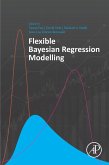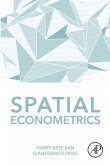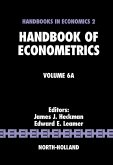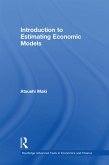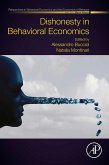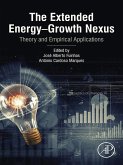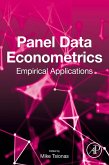Introduction to Agent-Based Economics describes the principal elements of agent-based computational economics (ACE). It illustrates ACE's theoretical foundations, which are rooted in the application of the concept of complexity to the social sciences, and it depicts its growth and development from a non-linear out-of-equilibrium approach to a state-of-the-art agent-based macroeconomics. The book helps readers gain a better understanding of the limits and perspectives of the ACE models and their capacity to reproduce economic phenomena and empirical patterns.
- Reviews the literature of agent-based computational economics
- Analyzes approaches to agents' expectations
- Covers one of the few large macroeconomic agent-based models, the Modellaccio
- Illustrates both analytical and computational methodologies for producing tractable solutions of macro ACE models
- Describes diffusion and amplification mechanisms
- Depicts macroeconomic experiments related to ACE implementations
Dieser Download kann aus rechtlichen Gründen nur mit Rechnungsadresse in A, B, BG, CY, CZ, D, DK, EW, E, FIN, F, GR, HR, H, IRL, I, LT, L, LR, M, NL, PL, P, R, S, SLO, SK ausgeliefert werden.
"Since the seminal Santa Fe conference on the Economy as an 'Evolving Complex System' in 1987, the science of complexity has made tremendous progress. The time is ripe for Economics to fully embrace these ideas and methods, and come up with plausible alternatives to mainstream models, with extreme fluctuations and crises as cases in point. This book offers an insightful overview of the recent developments in that direction." --Jean-Philippe Bouchaud, Capital Fund Management
"For a deep understanding of how a decentralized economy coordinates the economic activities of diverse actors, for better or worse, read this book by pioneers of agent-based economics. It will take you far beyond what you can learn from traditional equilibrium analysis." --Peter Howitt, Brown University
"Introduction to Agent-Based Economics is an excellent introduction to agent-based computational economics. A must-read for every student and scholar who wants to get started in the field." --Philipp Harting, Bielefeld University
"The book takes a fascinating view on an economy as an adaptive complex system. In contrast to the neoclassical paradigm, systemic risks such as financial crisis and other types of domino effects can be just a natural emergent outcome of interactions of heterogeneous adaptive agents and their evolutionary dynamics. Within a rigid world of economic discipline, Introduction to Agent-Based Economics offers a fresh view on economic reality and its resilience against shocks." --Tatiana Filatova, University of Twente
"A very useful guide for those who want to understand what agent-based models in economics are, and why they are becoming more and more popular." --Andrea Teglio, Universitat Jaume I"The book provides a comprehensive access to agent-based computational economics. It gives readers clear guidance on how agent-based macroeconomic models can be rigorously built with the aid of the empirical-based and network-based analytics." --Shu-Heng Chen, National Chengchi University
"This new book by the 'Ancona Group' of agent based macroeconomists led by Mauro Gallegati is an excellent addition to the rapidly growing literature on agent based macroeconomics. The book nicely blends chapters that may be used to teach the basics of agent based macroeconomics to graduate students with chapters that present advances in the area, from the experimental microfoundations of behavioural rules to the econometrics of agent based models, and from network models to the development of early warning indicators. The book therefore is required reading for those in the profession and graduate schools who want to be acquainted with this new and exciting field." --Domenico Delli Gatti, Università Cattolica del Sacro Cuore "The editors of this book are among the world's leaders in research on agent-based modeling of economic dynamics. This new volume presents the cutting edge of this research agenda with papers covering a range of microeconomic, macroeconomic, and financial issues, including such important matters as income distribution dynamics. This is not to be missed by anyone seriously interested in agent-based modeling." --J. Barkley Rosser, Jr., James Madison University
"For a deep understanding of how a decentralized economy coordinates the economic activities of diverse actors, for better or worse, read this book by pioneers of agent-based economics. It will take you far beyond what you can learn from traditional equilibrium analysis." --Peter Howitt, Brown University
"Introduction to Agent-Based Economics is an excellent introduction to agent-based computational economics. A must-read for every student and scholar who wants to get started in the field." --Philipp Harting, Bielefeld University
"The book takes a fascinating view on an economy as an adaptive complex system. In contrast to the neoclassical paradigm, systemic risks such as financial crisis and other types of domino effects can be just a natural emergent outcome of interactions of heterogeneous adaptive agents and their evolutionary dynamics. Within a rigid world of economic discipline, Introduction to Agent-Based Economics offers a fresh view on economic reality and its resilience against shocks." --Tatiana Filatova, University of Twente
"A very useful guide for those who want to understand what agent-based models in economics are, and why they are becoming more and more popular." --Andrea Teglio, Universitat Jaume I"The book provides a comprehensive access to agent-based computational economics. It gives readers clear guidance on how agent-based macroeconomic models can be rigorously built with the aid of the empirical-based and network-based analytics." --Shu-Heng Chen, National Chengchi University
"This new book by the 'Ancona Group' of agent based macroeconomists led by Mauro Gallegati is an excellent addition to the rapidly growing literature on agent based macroeconomics. The book nicely blends chapters that may be used to teach the basics of agent based macroeconomics to graduate students with chapters that present advances in the area, from the experimental microfoundations of behavioural rules to the econometrics of agent based models, and from network models to the development of early warning indicators. The book therefore is required reading for those in the profession and graduate schools who want to be acquainted with this new and exciting field." --Domenico Delli Gatti, Università Cattolica del Sacro Cuore "The editors of this book are among the world's leaders in research on agent-based modeling of economic dynamics. This new volume presents the cutting edge of this research agenda with papers covering a range of microeconomic, macroeconomic, and financial issues, including such important matters as income distribution dynamics. This is not to be missed by anyone seriously interested in agent-based modeling." --J. Barkley Rosser, Jr., James Madison University



